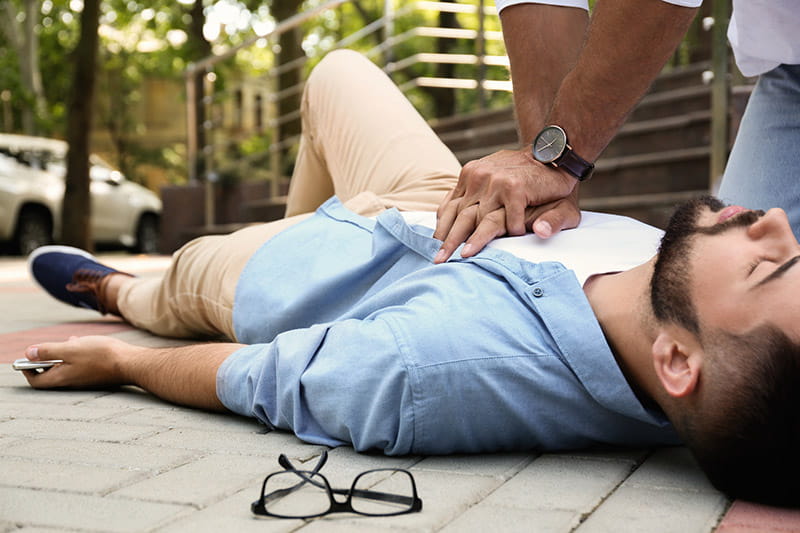Bystander CPR within 10 minutes of cardiac arrest may help chance for survival

(Liudmila Chernetska / iStock / Getty Images Plus)
Someone having a cardiac arrest at home or in public may have a greater chance for survival and protected brain function if CPR is started within the first 10 minutes, according to recent research.
The study(link opens in new window), published this year in the journal Resuscitation, found that people who received CPR within the first two minutes of an out-of-hospital cardiac arrest had the highest chance for survival and for retaining brain function. Some benefits could still be gained if help was given within 10 minutes.
“The longer it took for CPR to start, the less survival benefit one received,” said study researcher Dr. Evan O’Keefe, a cardiovascular fellow at Saint Luke’s Mid America Heart Institute and the University of Missouri-Kansas City. “However, even when CPR was started up to 10 minutes after cardiac arrest, there was still a significant survival benefit compared to individuals who did not receive CPR from a bystander.”
Cardiac arrest occurs when the heart abruptly stops beating. About 350,000 cardiac arrests happen outside the hospital each year in the U.S., with a survival rate under 10%, according to the American Heart Association. Chances for survival increase with CPR, an emergency lifesaving procedure that sends blood to the brain and other vital organs.
“These results highlight the critical importance of quick action in emergencies,” O’Keefe said. “It suggests that we need to focus on teaching more people how to perform CPR, and we also need to emphasize ways to get help to those suffering cardiac arrest faster.”
Getting help faster might come from more widespread CPR training programs, better public access to automated external defibrillators, or AEDs, and improved dispatch systems, he said. The study investigated whether there was a time limit for when bystander CPR would no longer increase a person’s odds of survival. Using data from the national Cardiac Arrest Registry to Enhance Survival, researchers analyzed outcomes for almost 200,000 witnessed out-of-hospital cardiac arrests that happened between 2013 and 2022 in people who were an average of 64 years old. About two-thirds were men.
Compared to people who received no bystander CPR, those who got it within two minutes had an 81% greater chance of surviving and being discharged from the hospital and a 95% higher chance of surviving without significant brain damage. Even people who did not receive CPR until up to 10 minutes later had a 19% higher survival rate than those who received no CPR. They were 22% more likely to survive without significant brain damage.
About 12% of people who did not receive bystander CPR survived to be released from the hospital, and more than 9% had no significant brain damage or major disabilities. People who received bystander CPR more than 10 minutes after a cardiac arrest had no higher chance of survival than people who didn’t receive CPR.
O’Keefe said the findings “reinforce that every second counts when starting bystander CPR and even a few minutes delay can make a big difference. If you see someone in need of CPR, don’t dwell on how long they’ve been down. Your quick actions could save their life.”
Learn more about Hands-only CPR, so when the time comes to save a life, you can be ready.





